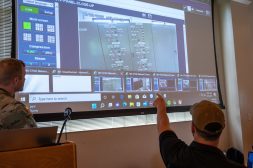New DARPA initiative gives contractors access to cutting edge commercial tech

Contractors working on emerging technology for the Defense Advanced Research Projects Agency could get access to the latest and greatest tech from other commercial companies through a new partnership the agency is forming with industry.
The Toolbox Initiative is a framework where DARPA facilitates agreements between “providers” of computing tech that could advance the work of DARPA’s contracted “performer” companies working on groundbreaking tech.
The program is currently gathering so-called “providers” to provide their tech, from chips to front-end compilers, to the DARPA “performers” working on everything from artificial intelligence to communications tech.
“We want the latest and greatest tech to come easy,” Serge Leef, the program manager in the Microsystems Technology Office leading the initiative, told FedScoop. Any time a performer spends haggling with another company for access to tech that could help advance science is “time wasted,” he added.
The Toolbox framework allows companies to access non-production licenses of intellectual property usually out of reach without lengthy contract negotiations on production terms, compensation and legal protections. It could help save the agency — which eventually would need to pick up the bill on costs associated with performers’ research — tens of millions of dollars, Leef said.
In the commercial world, if a chipmaker sells its tech to an autonomous car company, the manufacturer will put legal protections into the contracts to shield their tech from legal liabilities resulting from its use. It’s a process that can take months to settle legal negotiations over, said Leef, who has experience in private industry before coming to DARPA.
Since DARPA performers do not take their inventions to market or scale productions, they can use the non-production licenses for things like ARM processors or Rambus Inc.’s security interface controllers.
“I want the DARPA performers to have the same benefits as commercial industry,” Leef said.
For the providers in the program, they get essentially free marketing and access to the companies working on the cutting edge of science and technology. Leef described it as a win-win for both performers and providers.
The program is still waiting to fully launch, with an internal marketing campaign planned for the fall when DARPA plans to start hosting industry days. Leef said he has already heard from roughly a dozen other program managers interested in taking advantage of the framework to help their performers.






